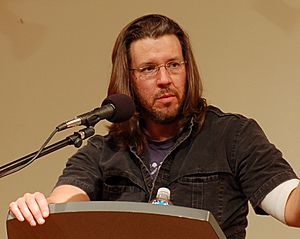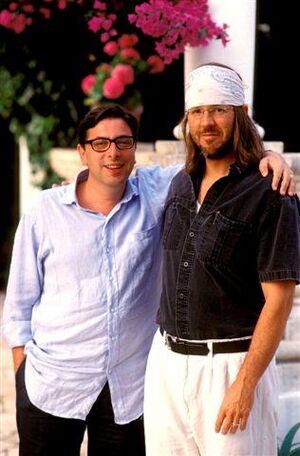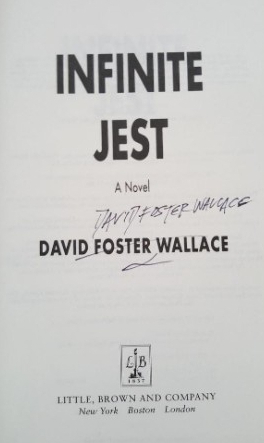David Foster Wallace facts for kids
Quick facts for kids
David Foster Wallace
|
|
|---|---|
 |
|
| Born | February 21, 1962 Ithaca, New York, U.S. |
| Died | September 12, 2008 (aged 46) Claremont, California, U.S. |
| Occupation |
|
| Education | Amherst College (BA) University of Arizona (MFA) Harvard University |
| Period | 1987–2008 |
| Genre |
|
| Literary movement |
|
| Notable works | Infinite Jest (1996) |
| Signature | |
David Foster Wallace (born February 21, 1962 – died September 12, 2008) was an American writer and university professor. He wrote novels, short stories, and essays. Wallace is best known for his 1996 novel Infinite Jest. Time magazine called it one of the 100 best English novels from 1923 to 2005.
After he passed away, his novel The Pale King (2011) was a finalist for the Pulitzer Prize for Fiction in 2012. Many people consider Wallace one of the most important and creative writers of his time. He grew up in Illinois and studied at Amherst College. He also taught English at several universities.
Contents
David Foster Wallace's Early Life and School
David Foster Wallace was born in Ithaca, New York. His parents were Sally Jean Wallace and James Donald Wallace. His family later moved to Champaign-Urbana, Illinois. He grew up there with his younger sister, Amy.
His father was a philosophy professor at the University of Illinois at Urbana-Champaign. His mother taught English at Parkland College. She even won a "Professor of the Year" award. David went to school in Urbana from fourth grade through high school.
When he was a teenager, Wallace was a talented tennis player. He even ranked regionally. He wrote about his tennis days in an essay called "Derivative Sport in Tornado Alley."
Wallace went to Amherst College, where his father had also studied. He focused on English and philosophy. He graduated with top honors in 1985. He also enjoyed singing in the glee club. His sister remembered he had a "lovely singing voice."
He wrote a special paper for his philosophy degree about logic and mathematics. This paper was later published as a book. Wallace also turned his English honors paper into his first novel, The Broom of the System (1987). He realized then that he wanted to be a writer. He felt writing used more of his abilities than philosophy. He earned a Master of Fine Arts degree in creative writing from the University of Arizona in 1987. He briefly studied philosophy at Harvard University but soon left to focus on writing.
David Foster Wallace's Later Life
In 2002, Wallace met the painter Karen L. Green. They got married on December 27, 2004.
Wallace loved dogs, especially those who had been treated badly. His friend Jonathan Franzen said Wallace was very patient with these dogs. He even thought about opening a shelter for stray dogs.
David Foster Wallace's Writing Career
His First Books and Teaching
Wallace's first novel, The Broom of the System (1987), got a lot of attention. Critics praised it. The New York Times called it a "manic, human, flawed extravaganza."
In 1991, Wallace started teaching literature at Emerson College in Boston. The next year, he moved to Illinois State University to teach English. He began writing his famous novel, Infinite Jest, in 1991. The book was published in 1996.
In 1997, Wallace received a special award called a MacArthur Fellowship. He also won the Aga Khan Prize for Fiction for one of his short stories.
In 2002, Wallace moved to Claremont, California. He became a professor of creative writing and English at Pomona College. He taught a few classes each semester and spent most of his time writing.
Wallace gave a speech to the graduating class at Kenyon College in 2005. This speech was later published as a book called This Is Water in 2009. Parts of the speech were also used in a popular online video.
Bonnie Nadell was Wallace's literary agent throughout his career. Michael Pietsch was his editor for Infinite Jest and other books.
Wallace passed away in 2008. In 2009, his publisher announced they would release an unfinished novel, The Pale King. His editor, Michael Pietsch, put the novel together from notes Wallace left behind. The Pale King was published on April 15, 2011. It received good reviews and was nominated for the Pulitzer Prize.
Writing Style and Ideas
Wallace wanted his writing to go beyond the usual styles of his time. He aimed to explore new ways of telling stories. He believed that too much irony (saying one thing but meaning the opposite) in TV and books could make people feel sad or stuck.
Wallace's stories often mixed different ways of writing. He used special words and made up new ones. His sentences were often long and complex. He also famously used many endnotes and footnotes in his books, like Infinite Jest. He explained that these notes helped him show how he saw reality without making the main story too confusing.
His work often explored how our thoughts are broken up. He also looked at the connection between happiness and boredom. He wrote about the beauty and strangeness of the human body. In his Kenyon College speech, Wallace talked about daily challenges and disappointments. He encouraged people to be kind and aware of others. He said that true freedom comes from paying attention and caring about others. He believed we get to decide what has meaning in our lives every day.
Nonfiction Writing
Wallace also wrote many nonfiction essays. He reviewed books for major newspapers like The Los Angeles Times and The New York Times. He also wrote short pieces about "the future of the American idea" for The Atlantic magazine.
These essays are collected in books like A Supposedly Fun Thing I'll Never Do Again, Consider the Lobster, and Both Flesh and Not. The last book includes some of his earliest writings.
David Foster Wallace's Death
Wallace's father shared that David had struggled with major depressive disorder for over 20 years. Medication had helped him be productive for a long time. In 2007, he stopped taking his main antidepressant. His depression returned, and other treatments did not help.
Memorial gatherings were held for Wallace at several universities. Many writers and friends spoke at these events, remembering his life and work.
David Foster Wallace's Legacy
In 2010, the University of Texas at Austin bought Wallace's personal papers and writings. This collection includes drafts of his books, stories, essays, and letters. They are kept at the Harry Ransom Center.
Many universities now offer courses about Wallace's work. The first David Foster Wallace Conference was held in 2014. In 2017, the International David Foster Wallace Society and a journal about his studies were started.
Many well-known writers have said that Wallace influenced their own work. These include Dave Eggers, Jonathan Franzen, John Green, and Zadie Smith.
Books and Stories as Films and Plays
Film and Television
- A movie based on his book Brief Interviews with Hideous Men was released in 2009.
- An episode of The Simpsons in 2012 was inspired by Wallace's essay "Shipping Out." Wallace even appears in the background of a scene in the episode.
- The 2015 film The End of the Tour is about conversations Wallace had with a journalist. Jason Segel played Wallace in the movie.
- The TV show Parks and Recreation often mentions Infinite Jest. The show's co-creator, Michael Schur, is a big fan of the book.
Stage and Music Adaptations
- Parts of Brief Interviews with Hideous Men were turned into a stage play in 2000.
- Another play based on Brief Interviews premiered in Buenos Aires in 2011.
- A short story called "Tri-Stan: I Sold Sissee Nar to Ecko" was made into a 50-minute opera.
- Infinite Jest was performed as a 24-hour stage play in Berlin, Germany.
- The short story "Good Old Neon" was adapted and performed as a play in 2011.
- The band The 1975 has a song called "Surrounded by Heads and Bodies." The title comes from the first line of Infinite Jest. The band's singer said he was inspired by the novel.
Awards and Honors
- Pulitzer Prize nomination for The Pale King, 2012
- Included in The O. Henry Prize Stories 2002 for "Good Old Neon"
- John D. and Catherine T. MacArthur Foundation Fellowship, 1997–2002
- Lannan Foundation Residency Fellow, July–August 2000
- Named to Usage Panel, The American Heritage Dictionary of the English Language 4th Ed. et seq., 1999
- Included in Prize Stories 1999: The O. Henry Awards for "The Depressed Person"
- Illinois State University, Outstanding University Researcher, 1998 and 1999
- Aga Khan Prize for Fiction for "Brief Interviews with Hideous Men #6", 1997
- Time magazine's Best Books of the Year (Fiction), 1996
- Salon Book Award (Fiction), 1996
- Lannan Literary Award (Fiction), 1996
- Included in Prize Stories 1989: The O. Henry Awards for "Here and There"
- Whiting Award, 1987
See also
 In Spanish: David Foster Wallace para niños
In Spanish: David Foster Wallace para niños
- Hysterical realism
- Postmodern literature
Images for kids
 | Frances Mary Albrier |
 | Whitney Young |
 | Muhammad Ali |



